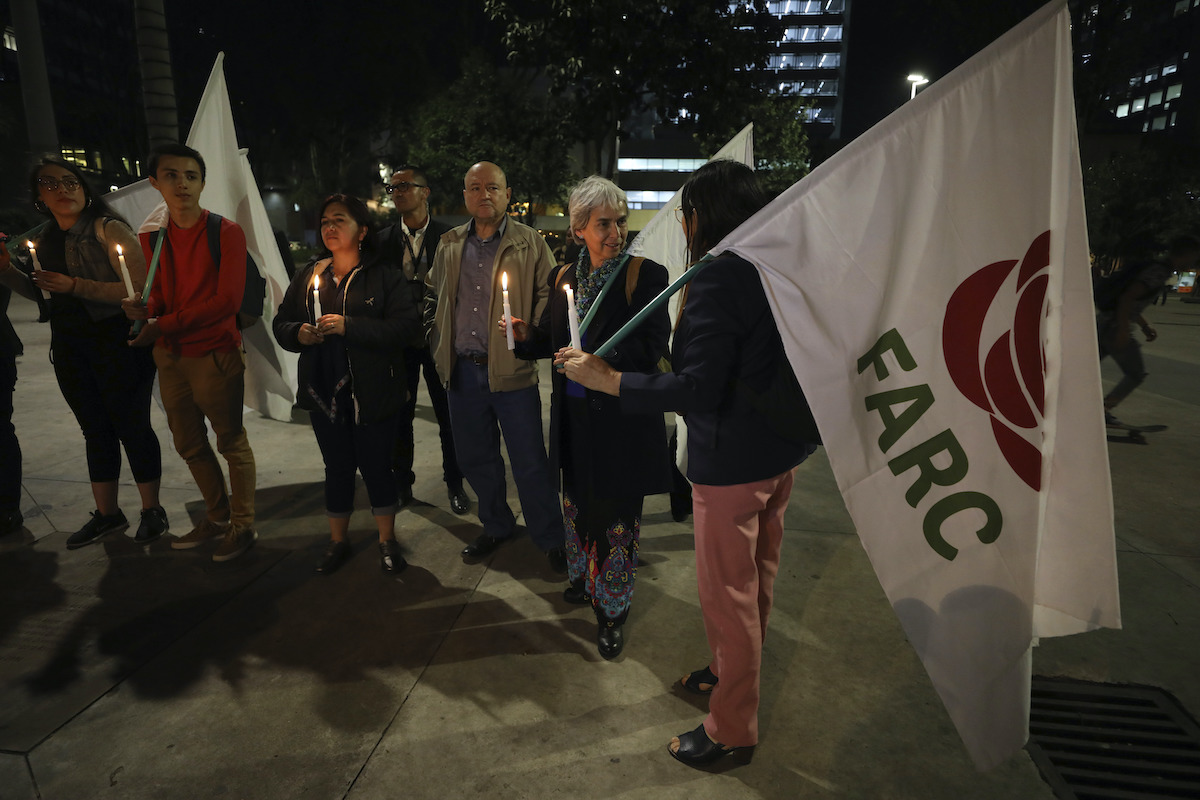

In this March 8, 2020 file photo, members of the Common Alternative Revolutionary Force, the political party formed after the disbanding of the Revolutionary Armed Forces of Colombia (FARC), hold a candlelight vigil for former rebels who have been murdered since the peace accord in Bogotá, Colombia. In January 2021, the demobilized guerrilla group changed its political party to “Comunes,” which translates roughly to Commoners or Commons. (AP Photo/Fernando Vergara, File)
By MANUEL RUEDA, Associated Press
BOGOTÁ, Colombia (AP) — The demobilized guerrilla group known as the Revolutionary Armed Forces of Colombia has changed the name of its political party in a bid to perform better with voters in next year’s congressional elections.
The FARC’s political party will now be known as Comunes, which translates roughly to commoners or commons. Party leaders said the name was selected unanimously during the party’s second national conference held last week.
“We agreed that the FARC name generates resistance in some sectors of society” the party said in a statement. “That is why we decided on a new name… that gathers the dreams and aspirations of our founders.”
As part of a 2016 peace deal with Colombia’s government that ended five decades of war, the FARC was allowed to register a political party and was also given 10 guaranteed seats in Congress for eight years.
The organization chose to keep its wartime Spanish-language acronym for its political party, though it changed its official name to the Common Alternative Revolutionary Force. But it had poor results.
The FARC’s presidential candidate in 2018 retired from the race early after suffering a heart attack, while in congressional elections the same year, the group managed only 32,000 votes or about 0.2% of the total amount.
The group has also suffered deep divisions, with some of its members heading to mainstream leftist movements while others have given up on the peace process altogether and returned to arms.
The former guerrillas have also faced growing violence against members of their organization. According to the United Nations, more than 250 former fighters have been murdered since the 2016 peace deal was signed.
Political analysts said the new name might help to distance the group from its violent past and from dissident groups that continue to use the FARC acronym.
But Sergio Guzmán, a Colombian political analyst, said the name change was little more than a “facelift.”
“There is nothing in recent announcements made by the FARC that suggest they are now in tune with what voters want” Guzmán said. He said the group is still pushing for economic policies like agricultural self-subsistence that are out of step with Colombia’s economic model, and that it has not complied with human rights commitments made during the peace deal.
“They have still not compensated war victims, they still haven’t admitted that they recruited children,” Guzmán said. “They have been stubborn for the past four years, and a simple name change does not suggest that the public will find their public policies appealing.”
The 2022 election will be the last contest in which the former rebels will have guaranteed seats in Congress. If the party doesn’t expand its electoral base, Guzmán said, it risks losing representation and becoming obsolete.
Comunes leaders said that in the 2022 campaign they will talk about the need to speed up implementation of Colombia’s peace deal and to improve health care access for Colombians.
The organization published a lengthy statement of its goals in which it also denounced “imperialist” attacks against the governments of Cuba and Venezuela.
The Comunes name, party leaders said, draws inspiration from a group of Colombian peasants who rebelled against the Spanish empire in the 18th century, and called themselves the “comuneros.”
Party leaders also said that the name Comunes had been used by peasants who were members of the communist party and formed guerrilla groups in the 1950s to defend themselves from incursions by the Colombian military.


